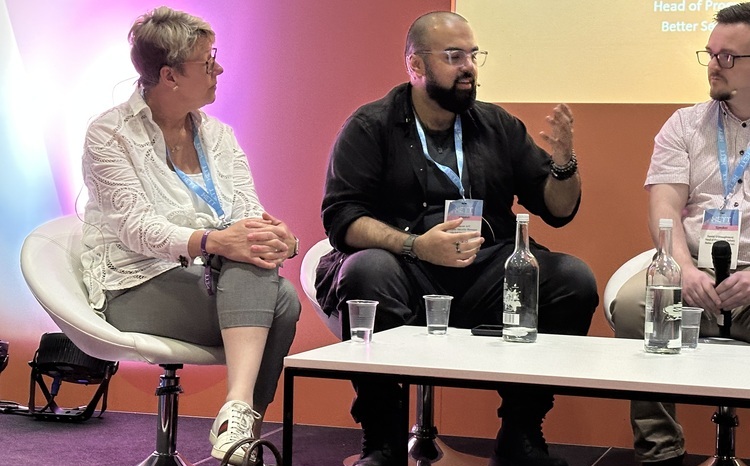Into the light
- 12 November 2014

The scene: a debate on whether the skills needed to be a good informatician and those needed to be a good leader are incompatible.
The question: how IT staff can be brought out of dark rooms and isolation and into wider discussions about healthcare transformation?
The response – from the director of informatics and business intelligence at NHS South West Commissioning Support Unit: one that provoked many laughs.
“Why would we want to do that?” asked Andy Kinnear, who for the purpose of the debate took on the persona of someone convinced IT people are best left dealing with servers. “These are people who deliberately chose a career of sitting in dark rooms.”
Step out, step up
As the saying goes, it’s funny because it’s true. Well, at least in part. EHI editor Jon Hoeksma admitted that the debate that opened the Health CIO Network Annual Conference was “deliberately counterintuitive, and a little bit provocative.
However, he said there was a “kernel of truth in the motion that: ‘This house believes the skills required to be an expert informatics professional are incompatible with those required to provide the transformational leadership to take the NHS into the digital age’.
It was not just the debate and Kinnear’s amusing contributions that proved that fact. In every one of the five sessions that made up the conference – which ran alongside EHI Live 2014 at NEC in Birmingham – the importance of chief information officers taking on a leadership role was emphasised.
Speaker after speaker argued that digital has an important part to play in transforming healthcare. But for it to have true impact, information technology professionals need to walk among colleagues – clinical and managerial – and engage in debates. Come out of the dark room, in other words.
Beverley Bryant, director of strategic systems and technology at NHS England, made an explicit appeal to that effect. “My call to arms at last year’s conference, which I continue to push and drive for, is building capability within yourselves,” she told delegates.
“I can’t emphasise enough the importance of CIOs stepping into this leadership space,” she continued. “Too many of our organisations don't know what to ask for – they don't know what good looks like. You do, and the time is right for you to stand up and say this is what good looks like and I can lead it.”
She said that building such capacity would involve CIOs “taking time out. Some of it is about going on a course, but it’s also about secondments, going to other trusts to see what they’ve done.”
Looking to the future
It was a theme echoed by Will Cavendish, the Department of Health’s new director general for innovation, growth and technology. There was, he suggested, a general skills gap when it came to the leadership of digital transformation.
“There are very few people in government, and very few people in health and social care, who have the background and skills to oversee digital transformation of health systems,” Cavendish suggested.
“In the Department of Health, in our own departments, we need better capability and understanding of digital transformation. We need to develop our capability.”
A Future Leaders panel highlighted the efforts to ensure tomorrow’s NHS leaders are informatics-savvy. The six-strong panel included those involved in the informatics specialism of the NHS graduate management training scheme, the lead for which stressed its focus on leadership.
“We recruit graduates into the scheme and encourage them to see themselves as a leader first and foremost – health leaders with a background in health informatics,” explained Sonia Srutek, programme lead for graduate schemes at the NHS Leadership Academy. “That’s the same for any trainee on any specialism.”
Lisa French, a graduate currently on the scheme, praised the way it made her possible for her to get a wider sense of how healthcare organisations operate. But she was concerned that her established colleagues in informatics did not seem to have the same chance.
“I get all these opportunities on this scheme – people say doors open – but I don’t think it’s fair or right that I’m the only person on the team to have those opportunities. You can’t wait for someone to be band 8 or above and then send them out into the wider organisation,” she argued.
“Historically, the NHS doesn't have great track record leadership for people in IM&T,” added Nick Hopkinson, associate director IM&T at Devon Partnership NHS Trust.
“If you look at most leaders in health IM&T, they haven't got there as part of structured programme – they have just found themselves there. I think it’s really important to create an environment where people can develop themselves.”
Lisa Franklin suggested that environment could include formal and informal elements. The director of IM&T at Southern Health NHS Foundation Trust, who serves as a mentor at The Association for Informatics Professionals in Health and Social Care (ASSIST), explained that her own leadership training had come from courses but also from networking.
“I genuinely believe that leadership isn’t a qualification,” she said. “It’s a series of relationships and how to use those relationships to affect change.”
Epic belief
A case in point came up during a session on the implementation of Epic at Cambridge University Hospitals NHS Foundation Trust.
Delegates were so keen to hear how the launch of the £200m infrastructure, mobility and electronic patient record project was going that it was standing room only as Carrie Armitage and Dr Afzal Chaudhry took to the podium.
The director of the eHospital programme and the trust’s chief clinical information officer explained how conversations and engagement between staff groups had been crucial to the project.
“Clinicians were central to all build teams for the EPR, and that took quite a lot of negotiating with all clinical divisions,” explained Dr Chaudhry. “And we sent out teams to each individual specialty to ask what sort of order sets the speciality wanted, want they wanted the screens to look like and so on. Literally hundreds of hours of conversations.”
It was a point which harked back to a suggestion made by Bryant at the beginning of the day. “This is a sell,” she argued. “We need our technology skills but if we talk in tech language to our boards, to our clinicians, we will not get past square one on this agenda.
“Believe in yourselves,” she urged the audience. “There’s some amazing talent out there, and you need to step up and take credit for that.”




